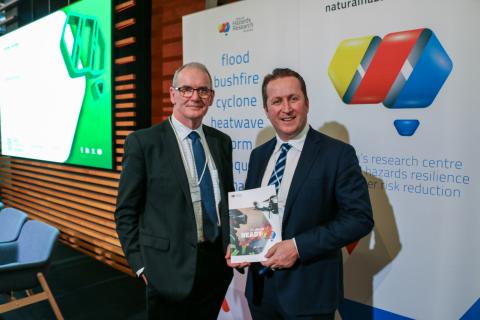


Be Ahead of Ready
Image: Brendan Moon, National Emergency Management Agency and Centre CEO Andrew Gissing.
Our generation of disaster risk reduction and emergency management practitioners are faced with worsening natural hazard risks. There is an urgent need to act to improve the safety, resilience and sustainability of communities.
That is why we have just launched our Be Ahead of Ready report - to inspire big ideas about future policy and capability needed for prosperity in future decades.
Be Ahead of Ready is about inspiring conversations about how to achieve a future end state where communities are safe, resilient and sustainable. It is to be ahead of the curve, where risk is foreseen, and proactive measures are taken to reduce or adapt to threats and ensure sufficient future capability to minimise impacts.
To Be Ahead of Ready means switching to a transformative way of thinking, moving beyond short-term considerations of the last disaster to a focus on the implications of longer-term trends.
Research plays a critical part in inspiring innovation, providing evidence and technologies and testing new ideas. Research can identify the knowledge needed to build upon and the gaps where we need to know more before we proceed.
We don’t pretend to have all the ideas, but it is important to inspire curiosity and discussion in an inclusive manner to explore transformation to get a step ahead.
We encourage everyone to be curious and think of their vision to Be Ahead of Ready. Download the report here.

Engagement, creating networks, reconciliation and thank you
The last month has again seen the Centre take great strides. The month started with the Centre’s Board meeting and stakeholder event in Canberra where research was showcased to national stakeholders and the Board approved additional projects from our 7th round of research funding. The Centre will be working with participants to scope these projects to onboard researchers in the coming months.
Whilst in Canberra the Centre ran a session on innovation with the AFAC Council featuring a presentation by scientific futurist Dr Catherine Ball exploring future innovation opportunities. Later that week, the Centre was represented at the National Memorial Service for Fire and Emergency Services Personnel.
Our research has been communicated and showcased at various forums this month including the Fire Australia Conference, the National Health and Safety Conference and the Floodplain Management Conference. The Floodplain Management Conference attracted over 400 delegates and featured Centre sponsored keynotes by Prof Gavin Smith (North Carolina State University) and Prof Paula Jarzabkowski (University of Queensland). Some 60 delegates also attended pre-conference workshops featuring the Centre’s post flood social research, A/Prof Mel Taylor (Macquarie University, NSW DCCEEW), Dr Carla Mooney (Bureau of Meteorology) and Dr Darryl Stellmach (University of Tasmania), and discussions on flood resilience strategies. It was fantastic to see how the Centre’s research is being used through the NSW SES’s new future flood campaign featured at the conference. Our booth in the exhibition hall was busy all week with enquiries about our projects.
This year’s Natural Hazards Research Forum in Adelaide from 14-16 May was a huge success. With statements such as “best forum ever”, the benchmark has certainly been set for next year. I would like to thank everyone for their attendance and participation and the Centre team for their efforts in delivering an amazing event. Further details about the 2025 Forum will be available in coming months.
The Forum was a great opportunity to launch the Centre’s Early- and Mid- Career Network. The purpose of the network is to support and advocate for the next generation of natural hazard leaders. I would like to congratulate those who have been appointed to the network’s Executive Committee, in particular the inaugural network Chair Dr Hamish Clarke from the University of Melbourne.
This week is National Reconciliation Week, an important time to reflect on how we can learn about shared histories, cultures and achievements, and to explore how we can contribute to achieving reconciliation in Australia. Through the journey of implementing the Centre’s Reflect Reconciliation Action Plan and beyond the Centre has been working to further promote First Nations research and to encourage First Nations participation in the Centre. You can read more about this in the recent blog by Chair of the Reconciliation Working Group George Goddard. If you’re looking for ways to learn more about reconciliation this week, there are seven projects that the Centre is conducting, or has already completed, that directly relate to First Nations communities. These cover topics such as: creating effective partnerships between Indigenous people and the emergency management sector; determining effective ways to facilitate and support Indigenous communities in leading Aboriginal land and sea management for country; developing Indigenous voice and representation in governance structures within organisations; improving the understanding of cultural conflict and load for First Nations staff and volunteers in emergency management; rekindling and strengthening Wolgalu and Wiradjuri connections to country in south east New South Wales; and foundations for Indigenous disaster resilience. Or watch these short videos from 2023 with Megan Considine (Cultural Natural Resource Management Officer, Brungle-Tumut, NSW) and Prof Lisa Slater (University of Wollongong), Oliver Costello (Jagun Alliance) and Dr Tim Neale (Deakin University), or our webinar for NAIDOC week 2023 celebrating First Nations Research.
Next week, we look forward to welcoming Prof Cheryl Desha to her role as the Centre’s Science and Innovation Director. I would also like to thank our outgoing Chief Science Officer, Prof Deborah Bunker for her efforts, particularly in progressing the Centre’s data catalogue, First Nation’s Scholarship and evaluation framework.